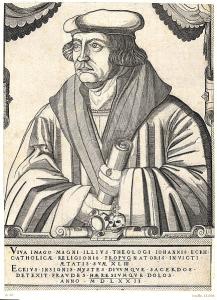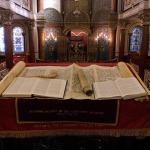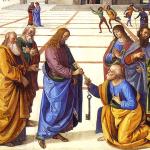“Please Hit ‘Subscribe’”! If you have received benefit from this or any of my other 4,600+ articles, please follow this blog by signing up (with your email address) on the sidebar to the right (you may have to scroll down a bit), above where there is an icon bar, “Sign Me Up!”: to receive notice when I post a new blog article. This is the equivalent of subscribing to a YouTube channel. Please also consider following me on Twitter / X and purchasing one or more of my 55 books. All of this helps me get more exposure, and (however little!) more income for my full-time apologetics work. Thanks so much and happy reading!
***
Johann Eck (1486-1543) was a German Catholic theologian, who was arguably one of Martin Luther’s two most important and formidable debate opponents, along with Erasmus (I’ve compiled several of his devastating replies to Luther as well). He was ordained as a priest in 1508 and in 1510 was installed as a professor of theology at the University of Ingolstadt in Bavaria: which lasted for thirty years. He mastered both Greek and Hebrew and had a prodigious memory, boundless energy, and very considerable debating skills. He famously engaged Luther for eighteen days in the Leipzig Disputation of July 1519.
Eck’s argumentation might be said to be one of the quintessential examples of the Catholic theological and polemical response to the Protestant Revolt up to the opening of the Council of Trent in 1545. This is one of many excerpts from his best-known and principal volume, Enchiridion of Commonplaces Against Luther and Other Enemies of the Church. It first appeared in 1529 and eventually went through 91 editions. I will be using a later edition from 1541 (translated by Ford Lewis Battles, Grand Rapids, Michigan: Baker Book House, 1979; now in the public domain).
Eck’s words will be in black; my interjections in blue, and citations from Luther and other famous Protestants in green. I use RSV for scriptural citations.
***
In the Old Testament an example is inferred where it is said: “leading men of the synagogue, and who in the time of assembly were called by name” [Num 16:2.]. “Obededom and his sons were assigned to the south, in which part of the house was the council of the elders” [1 Ch 25:16].
But in the New Testament one reads in the Acts of the Apostles of more councils being convened. I first mention one, after the ascension of the Lord, concerning the election of Matthias, where “Peter rising up in the midst of the brethren said . . . Men, brethren, the scripture must needs be fulfilled of which the Holy Spirit spoke before through the mouth of David concerning Judas, who was the leader of those who apprehended Jesus” [Acts l:15ff].
The second council was convened over the establishment of deacons for the ministry of the daily dispensation: “Then the Apostles, calling together the multitude of the disciples, said: It is not fitting that we should leave the word of God and serve tables. Therefore, select from among you seven men of good reputation, full of the Holy Spirit and wisdom, for us to appoint over this business” [Acts 6 :2f].
The third council was concerned with the question of observing legal matters; of this it is said: “But there arose some of the sect of the Pharisees that believed, saying: They must be circumcised, and be commanded to observe the law of Moses. And the Apostles and elders assembled to consider this matter” [Acts 15:5f], and afterwards a decision was made. “For it has seemed good to the Holy Spirit and to us, to lay no further burden upon you than these necessary things: that you abstain from things sacrificed to idols, and from blood, and from things strangled, and from fornication; from which things keeping yourselves, you shall do well” [Acts 15:28f], Note the form of the Apostolic Council. The Apostles and Elders assembled. The Gentiles did not set themselves against the Apostles. Now, by what authority, by what scripture, do you, Luther, do this toward councils? Why do you deprive us of the freedom given by Christ? For even if in deliberating they should cite scripture from Amos ch. 9 [:1ff], yet thereby they have brought forward nothing to forbid these three; likewise they have added no scripture in the decision.
Antioch too accepted Jerusalem’s decision. Luther despises Rome’s decision. It is clear that a council had the power of determining that any were necessary for that time, which nevertheless was not simply necessary for faith. Why then is the same power not today in the Church, as often as necessity demands it? There is the same Christ, the same Spirit, the same faith. Why then is there not an equal power of councils?
A fourth council was held by the Apostles in Jerusalem to do away with the suspicion of certain Jews, who thought Paul treated the ceremonies of the Law as if they were idolatry [Acts 15].
The fifth council was gathered under Paul at Miletus, concerning the rule of the Church, when “Paul sending to Ephesus, called the elders of the Church. And when they had come to him and were together, he said to them: You know . . . .” [Acts 20:17]. And later: “Take heed to yourselves, and to the whole flock . . . .” [Acts 20:28].] Likewise the Apostles celebrated another synod. For about to set out to preach the Gospel throughout the earth, according to the Lord’s command, meeting together, and each one offering his opinions, they handed on the Creed, as it is held from the tradition of the fathers, which the whole Church holds. For so St. Clement, disciple and successor of the Apostles attests in his decrees. Likewise Pope Leo I, writing to Augustine, says: “The short and perfect confession of the Catholic Creed has been sealed by the decisions of the twelve Apostles.” Likewise Ambrose, esteeming the key of the kingdom of heaven to be the faith of the Apostles, says: “I believe that this key has been fashioned by labor of the twelve workmen. For holy faith was conceived by the Creed of the twelve Apostles, who as skilled workmen coming together as one, fashioned the key by their council. For they called that Creed a key, through which the devil’s darkness is laid open, that the light of Christ may come.”
“Do not transgress the ancient boundaries, which your fathers have laid” [Prov 22:28].
“Again, I say to you, that if two of you shall consent upon earth, concerning anything whatsoever they shall ask, it shall be done to them by my Father who is in heaven. For where there are two or three gathered together in my name, there am I in the midst of them” [Mt 18:19f]. No one can more clearly be proved not to have heard the Church than if he did not hear a council.
In no place is there greater agreement than in a council. In no place are more gathered in the Lord’s name than in general councils.
“Ask the bygone generation, and diligently seek out the memory of the fathers, for we are but of yesterday and know nothing, for our days on earth are a shadow; they will teach you, and tell you, and utter words out of their heart” [Job 8:8-10]. “Wisdom is with the elders, and prudence in length of days” [Job 12:12]. Therefore let us hear councils and fathers, . . . If the authority of councils be taken away, then all things in the Church will be ambiguous, doubtful, uncertain, unsure, for at once will all the heresies condemned by councils return. . . .
“How great things he commanded our fathers, that they should make the same known to their children, that another generation might know them” [Ps 78:5f]. Therefore, let us believe the commandments, and trust the councils and the fathers.
Augustine, Epistle to Januarius [54.1]: “Those unwritten traditions that we preserve, which are observed throughout the earth, one is to understand, what by the Apostles themselves or plenary Councils (whose authority in the Church is most conducive to salvation) have been commanded and established to be kept.”
Augustine, Against the Donatists, 7.[1.1], assumes that the holy Catholic Church is fortified against the Donatists with the authority of a plenary council. And Book 1, chapter 18 [:28] adjudges a plenary Council to have the agreement of the entire Church.
[Pope] Gregory [the Great] in his Epistles [3.10]: “Just as the four books of the Evangelists, so also the four Councils do I confess to accept and venerate: namely, Nicea, Constantinople, Ephesus, and Chalcedon.”
Proposition 2: The greater Churches (just as they are in Council) represent the whole Church. This is very often made clear in Exodus. Take for example Ex 19:3, when God willed to give the Law to Moses, He commanded him: “These things you shall say to the house of Jacob and tell the children of Israel,” etc. And yet afterwards of Moses it is said: “Moses came, and calling together the chief born of the people, he set forth all the words …” etc. [Ex 19:7]. And although only the elders of the people answered, when Moses spoke to them, still the text subjoins: “All the people answered together” [Ex 19:8] etc. It was not all the people, unless by representation.
“Ask your father, and he will declare to you: your elders and they will tell you” [Dt 32:7].
“Despise not the discourse of the wise elders, . . . but acquaint yourself with their proverbs. For from them you shall learn wisdom and instruction of understanding, and to serve great men without blame” [Ecclus 8:9f]. Let not the discourse of the elders be passed over, for they have learned from their fathers, since from them you shall learn understanding and instruction. . . .
[Objection] 1. In a council are men: therefore they often deceive and are deceived, since “Every man is a liar” [Ps 115:11].
[Reply] We admit that those who assemble in Councils are men, yet in a lawful General Council, they are governed by the Holy Spirit as their guided who does not allow them to be deceived. For Paul and John, Isaiah and David, were men, yet Paul says in his Epistle 2 to the Galatians (1:8): “If an angel from heaven should preach a gospel other than what we have preached to you, let him be anathema.” Therefore the canonical writers wrote infallibly, yet they were men. Likewise the fathers in the Councils.
***
*
Practical Matters: Perhaps some of my 4,600+ free online articles (the most comprehensive “one-stop” Catholic apologetics site) or fifty-five books have helped you (by God’s grace) to decide to become Catholic or to return to the Church, or better understand some doctrines and why we believe them.
Or you may believe my work is worthy to support for the purpose of apologetics and evangelism in general. If so, please seriously consider a much-needed financial contribution. I’m always in need of more funds: especially monthly support. “The laborer is worthy of his wages” (1 Tim 5:18, NKJV). 1 December 2021 was my 20th anniversary as a full-time Catholic apologist, and February 2022 marked the 25th anniversary of my blog.
PayPal donations are the easiest: just send to my email address: [email protected]. Here’s also a second page to get to PayPal. You’ll see the term “Catholic Used Book Service”, which is my old side-business. To learn about the different methods of contributing (including Zelle), see my page: About Catholic Apologist Dave Armstrong / Donation Information. Thanks a million from the bottom of my heart!
*
***
*
Photo credit: Johannes Eck, katholischer Theologe Gegner Martin Luthers Kupferstich von Peter Weinher d. Ä. (1572) (source) [public domain / Wikimedia Commons]
Summary: One of a series of posts documenting the Catholic apologetics efforts of Johann Eck (1486-1543) against various Protestants. This installment addresses councils.













